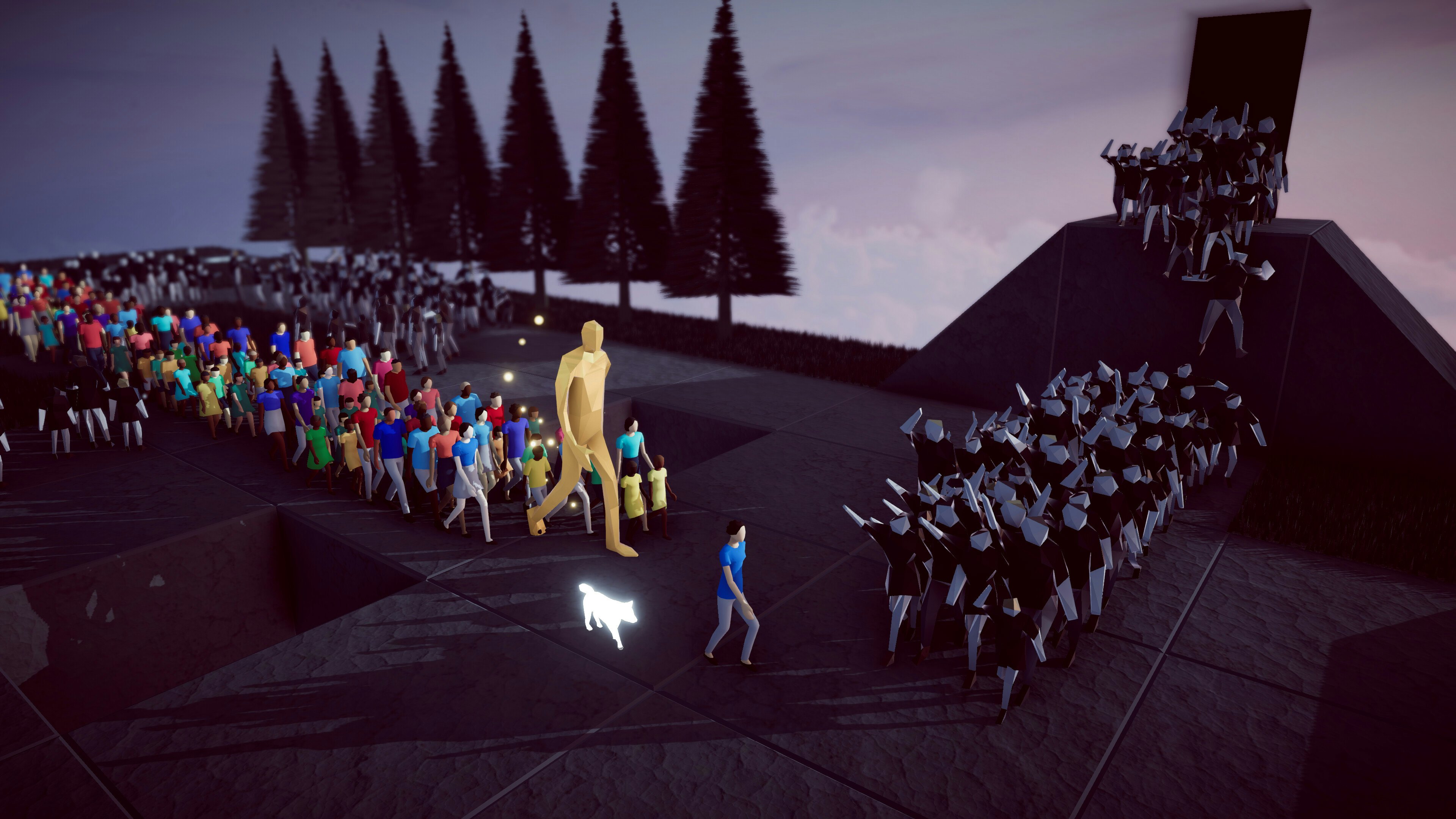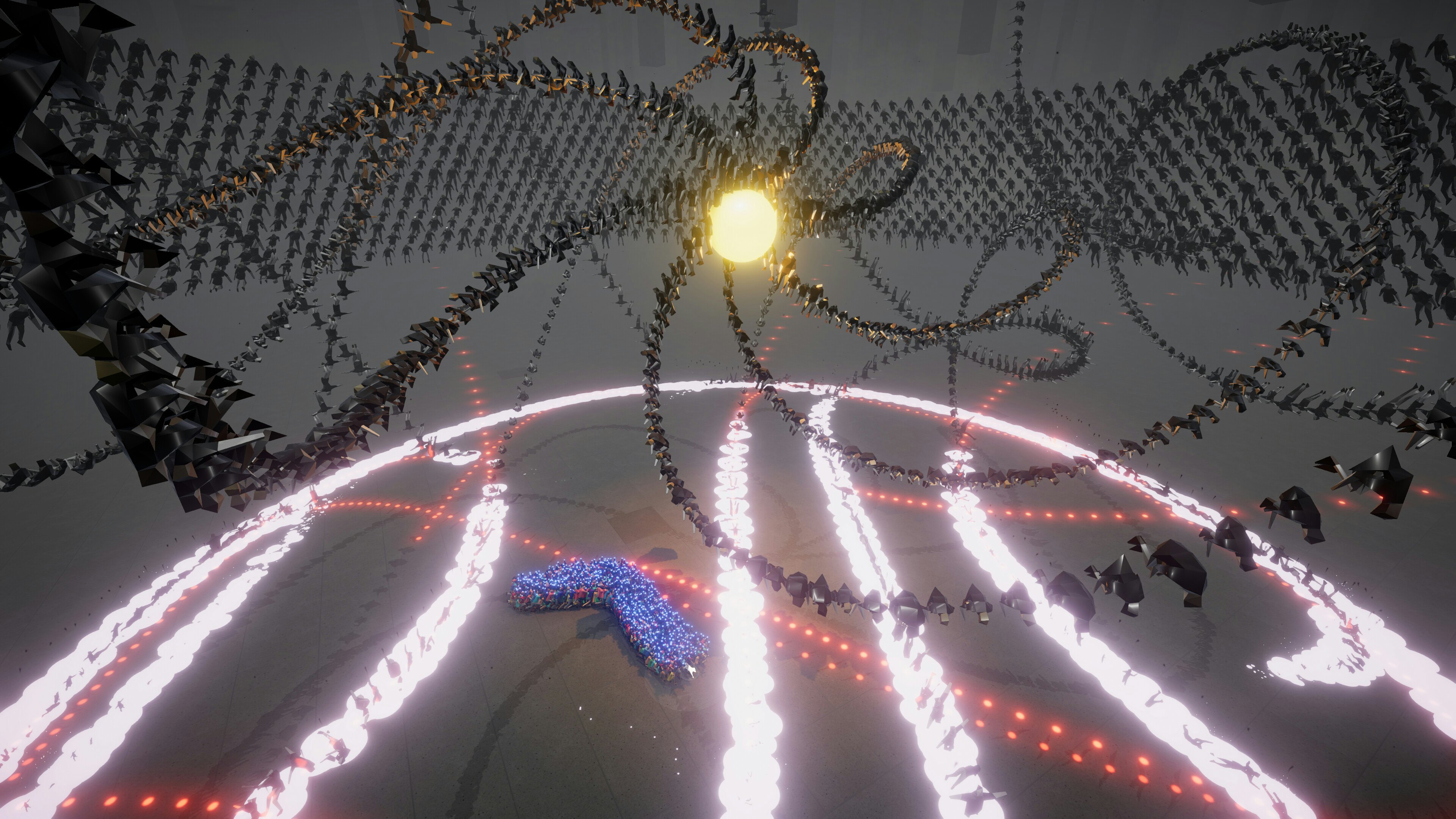
You’d think a puzzle game about people standing in lines wouldn’t be that much fun. You probably get enough of that in real life while you’re waiting to pay for groceries or get on the bus, but I also bet both of those activities would be way more tolerable if you had a glowing Shiba Inu guiding your way. At least, I’d like to think so, because in Humanity, you play as that Shiba Inu and then I’ll feel better about all the people I led off cliffs and into laser fire if I imagine they were enjoying it.
Luminous dogs aside, the concept of Humanity is pretty simple. Players need to guide a group of people from a fixed entrance, where they magically appear on screen, to an exit. Along the way are obstacles to avoid and winding paths to follow, and sometimes they need to collect objects on the way. But from that intuitive premise, Humanity quickly piles on new twists to make your job as a guide dog harder and way more satisfying.
In the story of Humanity, you are a sentient AI tasked with evaluating the teeming masses of humankind and leading them on to the next stage of their evolution. You’ve assumed the shape of a glowing Shiba Inu because, hey, why not? The story lends an air of gravitas and some comical absurdity to the proceedings, but it’s far from the game’s focus.
That focus, instead, is on its puzzles. At first, you guide your loyal humans around levels by just placing arrows on the floor. Like good little automatons, the humans follow the direction of your arrows, and the challenge just lies in creating a linear path for them to follow to the exit. Soon, though, you gain more commands, which tell the crowd to jump or split into smaller groups. The levels themselves get more complex at the same time, making longer, more complicated sets of instructions necessary to get all of your obedient humans to the exits.
I say “all of your obedient humans,” but that’s not entirely true. At least for the first stretch of Humanity, you just need to get enough of them across the finish line. You can point an arrow in the wrong direction, sending a waterfall of mindless drones tumbling into the void, and it won’t matter one bit. That makes Humanity an extremely chill experience, where experimenting with new solutions is always a good idea and you won’t have to repeat levels just because you happen to let a few dozen people slip off into the howling abyss.

Later levels mix things up, and I found some of Humanity’s mechanical twists more successful than others. Some levels have you guiding your humans directly rather than just giving them directions, and others limit your total units so you can’t be quite so callous about letting them dive into oblivion. In some stages, you need to collect keys or ride moving platforms while avoiding security robots. These all add some stress to the experience, but are generally welcome additions.
However, Humanity also changes from a chill puzzle game to a strange real-time strategy hybrid a short way into the story. An enemy faction of humans appears, and a great number of puzzles revolve around eliminating them before they can do the same to your own flock. Most critics seemed to really like this element, but I found it was far less enjoyable than the purely navigational puzzles and kind of messed up the whole point of the story (for all that that matters).
Even if you share my distaste for pitting armies against each other with laser guns and batons, there’s still a lot to like in Humanity. It still puts its puzzles front and center — combat is just one more form of puzzle. And from start to finish, it's a beautiful game in many ways. The spectacle of watching these intertwining rows of faceless humans wind their way through each stage is captivating, especially in levels that incorporate high jumps and symmetrical splinter groups of people charging toward the goal. Once you complete a level, you can just sit back and watch them continue their march, turning the experience into a piece of installation art in motion.

Humanity’s soundtrack is likewise fantastic, which should be unsurprising once you learn that it’s made by Enhance, the developer of the trippy musical adventure Rez. Blending ethereal choirs and harsh electronic bloops, the music in Humanity is really like nothing else I’ve ever heard in a game. Between its mesmerizing visuals and pulsing soundtrack, Humanity had me sinking into a puzzle-solving trance, especially in longer levels that require drawn-out solutions and plenty of contemplation.
We’ve been inundated with great puzzle games lately, but if you missed Humanity when it launched last year, it’s well worth checking out. If you get really absorbed, each level includes optional objectives to keep you playing, and a custom level editor means there’s an endless supply of player-made stages to keep you coming back. If it’s a more relaxed experience you’re looking for, Humanity even has built-in video guides for each level, which won’t help you nab optional objectives but will at least show you the quickest path to the end.
Despite my issues with its detour into laser-based warfare, just watching videos of the game in action makes me want to dive back in for another round. As both a challenging puzzler and a surreal, meditative art piece, Humanity is like no other game on Xbox Game Pass.







